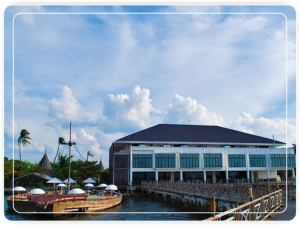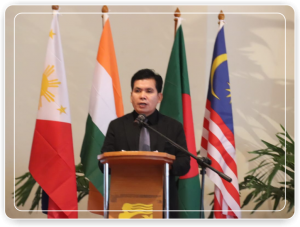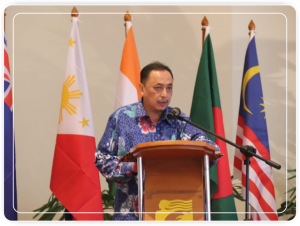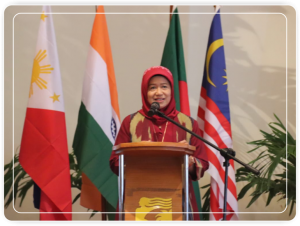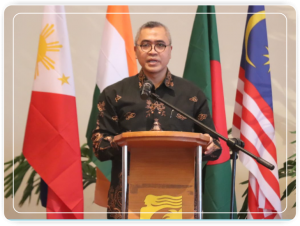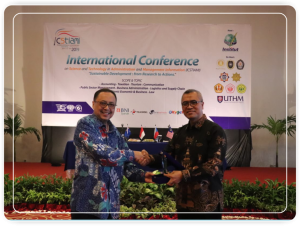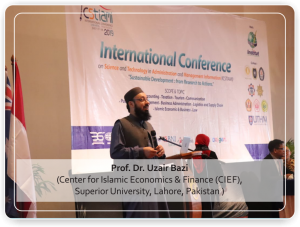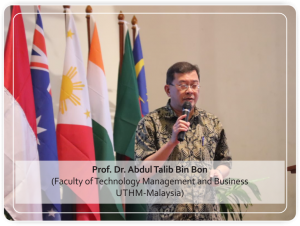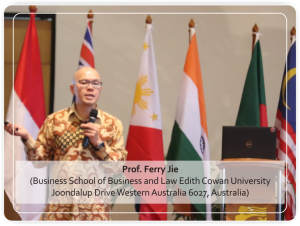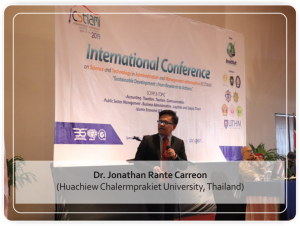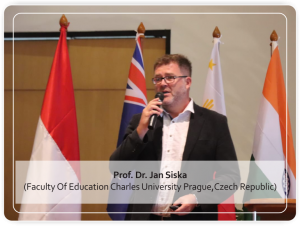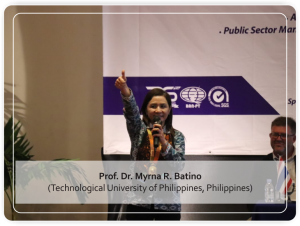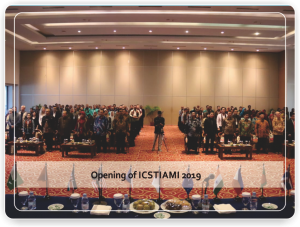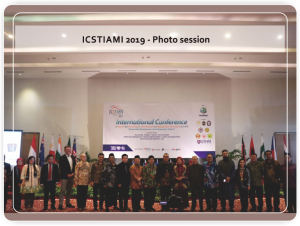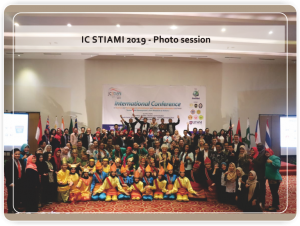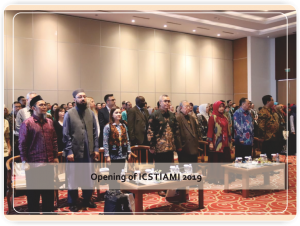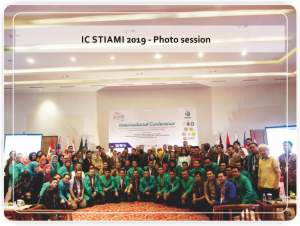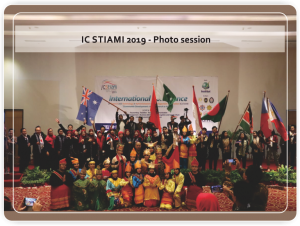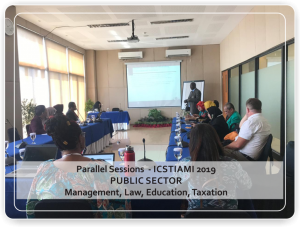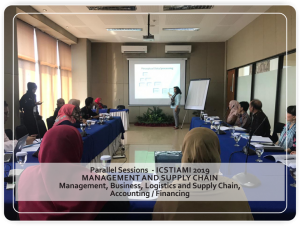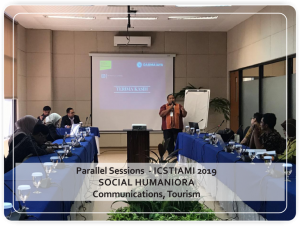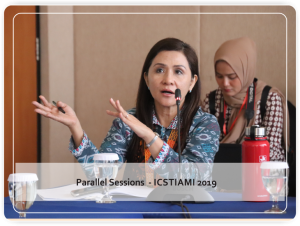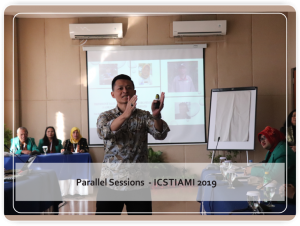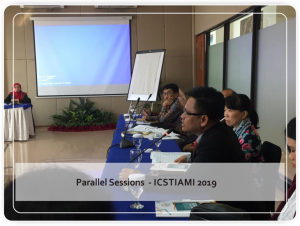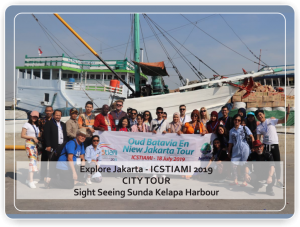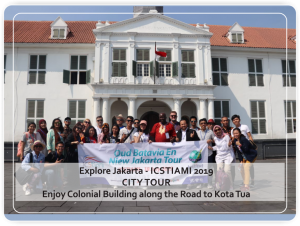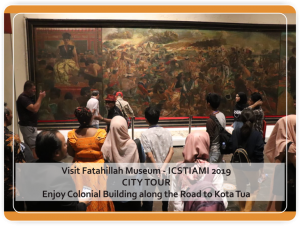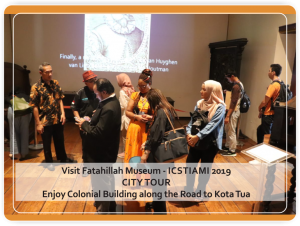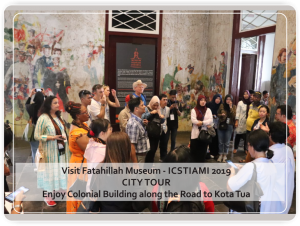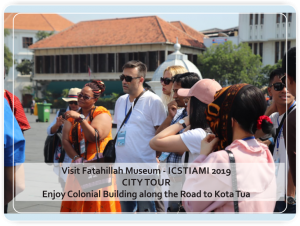Seminar Internasional
INTERNATIONAL CONFERENCE #1
on July 17-18, 2019 in Jakarta, Indonesia. The 2019 International Conference on Science and Technology in Administration and Management Information (ICSTIAMI). Theme “Sustainable Development: from Research to Actions”
1. Prof. Dr. Tulus Suryanto : General Chair for IC Comiitee, participanst, keynote speaker, co host, international partners. Has 100 more than paper , 57 in english conference. Collaborate with 20 university. SDG for achievement.
2. Dr. Panji Hendarso, M.M : Rector Of Institut STIAMI speech to representated Governor, LLDIKTI, Prof Tulus, keynote speaker, the head of yayasan Ilomata, and all speaker from Australia, Malaysia, Kenya, Filipina. Thailand.
3. Dr. Ir. Lilah Sailah, MS, Coordinator of LLDIKTI 3 : Speech from head LLDIKTI : Welcoming for the participants, greeting to Rector and head of Ilomata Foundation, keynote speaker, guest presentative from all country. Speaker from kenya. Congratultion for STIAMI, because organising the first IC STIAMI. STIAMI can continue celebrate this IC STIAMI in era of industrial 4.0 . we hope in discusion in this IC we can get the new issue, maybe most of the expert can refers the research impact the tecnology to behaviour/culture. We also have development cyber program not only in adminstration/ management, maybe we can collaborate with another multi dicipline. Maybe trans dicipline. Doctoral program, government indonesia have a regulary for PhD program must has international article, Indonesia can collaborate with another country, because in our country has tri dharma.
4. Keynote Speaker : Prof. Dr. Eko Prasojo, University of Indonesia Public Policy Expert, Mainstreaming SDGs In National Developmett Program To trenghtening Public Sector Reform In Indonesia. Three important things to understand global society : a. Digital Governance b. Global Governance c. Knowledge sosiality, our priority to implement SDGs in indonesia. Comitmen Indonesian Governance to achive SDGs Presidential Regulation No. 59 Year 2017 on Implementation of the SGDs, with this regulate . implentation SDG in Indonesia. Optimizing the coordination role of Ministry of National Development Planning to achieve the SGDs, Involving all stakeholders (Government, Private Sector, CSO, Academicians, Philanthropy, Public, Media) to synergize according to their respective roles, Institutional Arrangement for achieving the SGDs. But also we neeed to arrage in goverment instituition to achieve the goal SD, a. Partnership Platform : Public Sector and Philanthropy : Advocating the SGD: Agenda to the Private Sector b. Facilitating program and activities to the private sector c. Funding support . Academic and : to proceduce regulatory for government. Respectect this conference wiith this themes, because education has a knowledge and regulation. Not only publicate to citizen but also to implementation this concept. From whit partneship platform we hope can make benefit in goals of the SDgs.
INTERNATIONAL CONFERENCE #2
Plenary Session:
1. Prof. Ferry Jie (Business School of Business and Law Edith Cowan University Joondalup Drive Western Australia 6027, Australia)
A Suppy chain consists of the flow of producta and services, connected by transportastion and need vertically integrated. Supply Chain Management is The planning and management of all activities involved in sourcing and procurement, conversion, and all logistics management activities … also includes coordination with channel partners, which can be suppliers, intermediaries, third party service providers, and customers. (Council of Supply Chain Management Professionals).
2. Dr. Jonathan Rante Carreon (Huachiew Chalermprakiet University, Thailand)
Use of social media for communication in Industrial Revolution 4.0. Social media is a popular buzzword as well as technological concept, which has brought about pervasive changes in business-to-business communication, business-to-customer communication, and customer-to-customer communication (Kietzmann, Hermkens, McCarthy, & Silvestre, 2011). Arround people in the world use social media , digital around the world in 2019 with the total population 7.676 billion , mobile social media users is 3.256 billion. Wang , yu dan Wei (2012) investigates peer communication through social media websites; individual-level tie strength and group-level identification with the peer group as antecedents; and product attitudes and purchase decisions as outcomes. Social Media and Digital Disruption: IMPACT , Previously dominant firms—including telecommunications carriers, equipment providers, and powerful legacy software firms—are under assault from the move to cloud computing, in the network center, and mobile computing, on the network periphery. This transformation of the computing and communication infrastructure has been occurring simultaneously with the spread of ever more complicated and sophisticated global value chains.
3. Prof.Dr.Jan Siska (Faculty Of Education Charles University Prague,Czech Republic)
Disability,Responsibility and Change. The Construct of Disability changed from focusing on pathology or a defect within the person to a socio-ecological person–environment fit conception that focuses on understanding human functioning and disability based on the interactions between personal and environmental characteristics. UN Convention of Persons with Disabilities 2006, „To promote, protect and ensure the full and equal enjoyment of all human rights and fundamental freedoms by all persons with disabilities, and to promote respect for their inherent dignity“. Unique about the convention are :
a. Both a development and human rights instrument
b. A policy instrument which is cross-disability and cross-sectoral
c. Legally binding.
European Disability Strategy 2020. The European Disability Strategy 2010- 2020 adopted by the European Commission in November 2010, represents a fundamental policy instrument for persons with disabilities and their organisations to be used in order to make a barrier-free Europe. The Strategy identifies eight main areas for action: Accessibility, Participation, Equality, Employment, Education and Training, Social Protection, Health, and External Action.
4. Prof.Dr.Uzair Bazi (Center for Islamic Economics & Finance (CIEF), Superior University, Lahore, Pakistan )
Bai Salam Project, a Project to Eliminate Riba from the Agriculture. Why This Project because riba is haram, private sector money lending act, 2007 (Private Source Facilities Closed), goverment. must provide an alternate. Bai salam advance payment 100% against future delivery of agri produce, and operation through a public sector bank. Bai salam project has a purpose to complete eradication of riba from the agri economy , implementation support by state solid convictiona required to achieve the objective of facialiting the farmers and save them from the claws of riba, and improve the agricultural economy.
5. Prof. Dr. Myrna R. Batino (Technological University of Philippines, Philippines)
Sustainable Development: from Research to Actions. Sustaainable development change for sustainable development but focusing on the “public good” areas of sustainability , though much desired, has become an oxymoron, 70 years , human progress founded on economic growth has been expressive in all areas. Given the increasing difficulties in conciliating economic growth, social well-being and environmental sustainability, the 3 pillars of the Rio+20 Conference have morphed into a trilemma. Economic growth has been grounded on the unsustainable use of non-renewable resources as well on the reduction of biodiversity. With the spread of economic globalization, social and environment crises have deepened while the trajectory of the world economy shows signs of exhaustion in the hegemonic model itself. The three pillars of sustainability that have become a trilemma at Rio+20 Conf – economic, social, and environmental.
6. Prof. Dr. Abdul Talib Bin Bon (Faculty Of Technology Management and Business UTHM-Malaysia)
Preparing Management, Economy and Business in order to face the Industrial Revolution 4.0. Phases of earlier 3 Industrial Revolutions :
1). 1760 to 1840 – Ushered in Mechanical production; railways and steam engine 2). 1870 to 1940 – Mass production; electricity and assembly line 3). 1960 to 2010 – Computers; semi conductors, main frame computing, personal devices, internet.
A collective term for technologies and concepts of value chain organization. Based on the technological concepts of cyber-physical systems, the Internet of Things and the Internet of Services, it facilitates the vision of the Smart Factory. Within the modular structured Smart Factories of Industry 4.0, cyber-physical systems monitor physical processes, create a virtual copy of the physical world and make decentralized decisions. Over the Internet of Things, Cyber-physical systems communicate & cooperate with each other & humans in real time. Via the Internet of Services, both internal & cross-organizational services are offered & utilized by participants of the value chain. A cyber-physical system (CPS) is a system of collaborating computational elements controlling physical entities. CPS are physical and engineered systems whose operations are monitored, coordinated, controlled and integrated by a computing and communication core. They allow us to add capabilities to physical systems by merging computing and communication with physical processes. Six Design Principles : Interoperability: the ability of cyber-physical systems (i.e. work piece carriers, assembly stations and products), humans and Smart Factories to connect and communicate with each other via the Internet of Things and the Internet of Services; Virtualization: a virtual copy of the Smart Factory which is created by linking sensor data (from monitoring physical processes) with virtual plant model and simulation models ; Decentralization: the ability of cyber-physical systems within Smart Factories to make decisions on their own ; Real-Time Capability: the capability to collect and analyze data and provide the insights immediately; Service Orientation: offering of services (of cyber-physical systems, humans and Smart Factories) via the Internet of Services ; Modularity: flexible adaptation of Smart Factories for changing requirements of individual modules. Building blocks of Industry 4.0 with autonomous robots , simulation, horizontal and vertical system integration, industrial internet of things, cyber security, additive mfg, augmented reality, big data analytics. We need Insustry 4.0 because the cost to eliminate waste and losses, to eliminate hidden cost and cost ruction ; complexity , sub nano tecnologu, cyber physical system and exponential technologies; customer , to personalize, fast, cheap , quality and total customer satisfaction ; Competition , to digitilazation, to increase competitiveness, and to globalization.
INTERNATIONAL CONFERENCE #3
Scope and Topic :
Accounting – Taxation – Tourism – Communication – Public Sector Management – Bussiness Administration – Logistics and Suply Chain Management – Islamic Economic and Bussiness – Law
Accounting
1. Accounting and Auditing for Public Sector 2. Behaviour Case Based Auditing
3. Management Accounting 4. Performance Measurement Control
Taxation
1. Tax Payer Behaviour 2. Tax in E-Commerce 3. Exchange Information in Taxation
Tourism
1. Gastronomy and Culinary in Tourism 2. Halal Tourism
Public Sector Management
1. Sustainable Development 2. Innovation and Bureaucracy Reform
3. Leadership in The Public Sector 4. Capacity Building in The Public Sector
5. Decentralization and Local Government 6. Public Policy in Developing Countries
7. Public Sector Budgeting 8. Collaborative Management 9. Public Policy in Education Sector 10. Public Services
Law
1. Business Law 2. Environmental And Energy Law 3. Procurement And Business Regulations 4. Labour Law And Social Policy 5. orporate Finance Law And Taxation Law
6. Sector Information Policy 7. International Economics And Trade Law
8. Web-science and e-Business Policy
INTERNATIONAL CONFERENCE #City Tour
PARALLEL SESSION 1
Session : SOCIAL HUMANIORA (Communicaton, Tourism)
Chair : Dr. Ade Tuti Turistiati, MIRHM
Areas relevant to the scope of the journal include Social Sciences, Education, Media and Communication studies, Humanities, Tourism, Arts and Culture, Linguistics, Literature, Philosophy. Research as well as literary study articles submitted should be original and have never been published anywhere.
PARALLEL SESSION 2
Session : PUBLIC SECTOR MANAGEMENT, LAW, EDUCATION
Chair : Dra. Baby Sri Murniati Poernomo, MA
Work on the basis of individual or group concepts of justice, fairness, and advancement of the public good. “Public service” refers specifically to work conducted while in a government position but is often included under the public interest umbrella. Both terms encompass a wide range of legal work carried out in varied settings.* Public interest and public service work can be deeply fulfilling on both a professional and personal level.
PARALLEL SESSION 3
Session : MANAGEMENT, LOGISTICS AND SUPPLY CHAIN
Chair : Daryanto Hesthi Wibowo, SE, Akt. CA, MA
Management, Logistics and Supply Chain is about planning and controlling the activities of a company as well as coordination between companies, in order to secure that the right product is delivered in the right quantities, to the right customer, at the right time and to the right price. How to design a strategy and a structure for a supply chain.
Methods for planning and controlling flows of goods and information in a supply chain. This includes a solid understanding of the necessary IT-based tools and how to work with data, matching the increased focus on big data, business analytics, and decision science.
INTERNATIONAL CONFERENCE #City Tour
City Tour ICSTIAMI – Sunda Kelapa Harbour
Sunda Kelapa Harbor provides a glimpse of the country’s history and people. Ideal for first-time visitors to Jakarta, this half-day itinerary includes expert commentary from your own personal guide.
Jakarta’s old port, Sunda Kelapa is a popular stop on any tour of historic Jakarta (or Batavia, as it once was). Wooden 2-masted pinisi sailing ships still moor here, while porters move goods to and fro as they have since the 13th century. Converted warehouses hold the Maritime Museum, and a watchtower and lighthouses stand guard over the bustling harbor. You might see Sunda Kelapa signposted as “Pelabuhan Sunda Kelapa”: the word “pelabuhan” simply means port, or harbor, in Indonesian. Wear comfortable shoes to visit Old Batavia.
Sunda Kelapa was the original settlement on which Jakarta is based. When Indonesia achieved independence after World War II, the city took the name Djakarta (Jakarta).
City Tour ICSTIAMI – Kota Tua
Trip back in time to the colonial past of the “the Queen of the East.” Explore Jakarta’s historical district of Batavia and learn about the events that have shaped the city’s history. Meet your guide in the heart of Kota Tua.
Visit the historical sights of the Batavia district, admire Jakarta’s wonderful mix of modern and colonial architecture. Visit some of the oldest museums in Jakarta: including the Jakarta History Museum, and more treat yourself to the best of Jakarta’s famous street food.
Museum Museum in Fatahillah Area :
Jakarta History Museum / Fatahillah
Museum of Bank Indonesia
Puppet Museum
Museum of Ceramics
